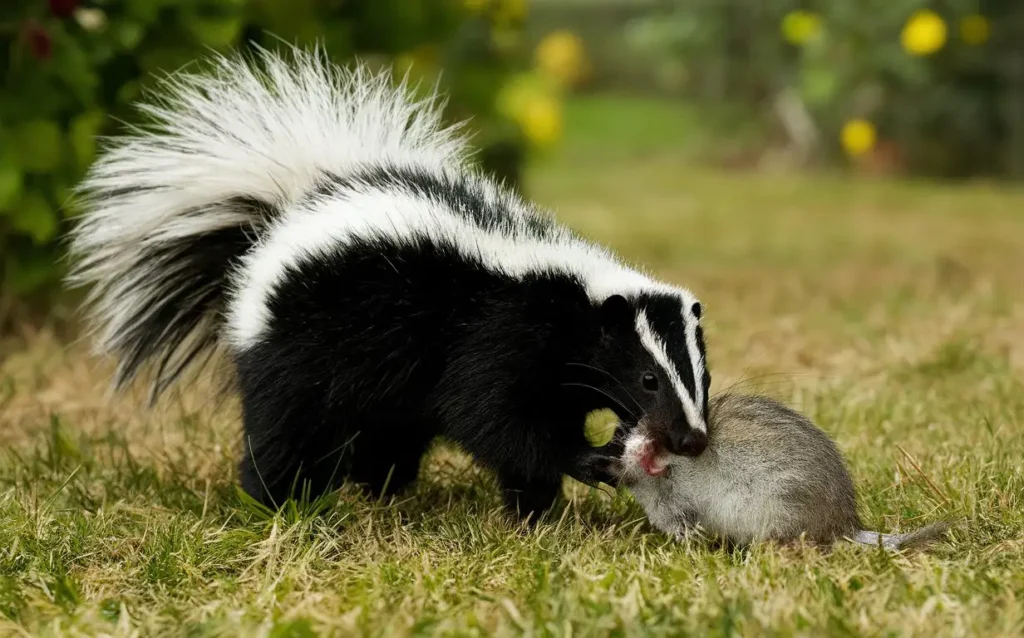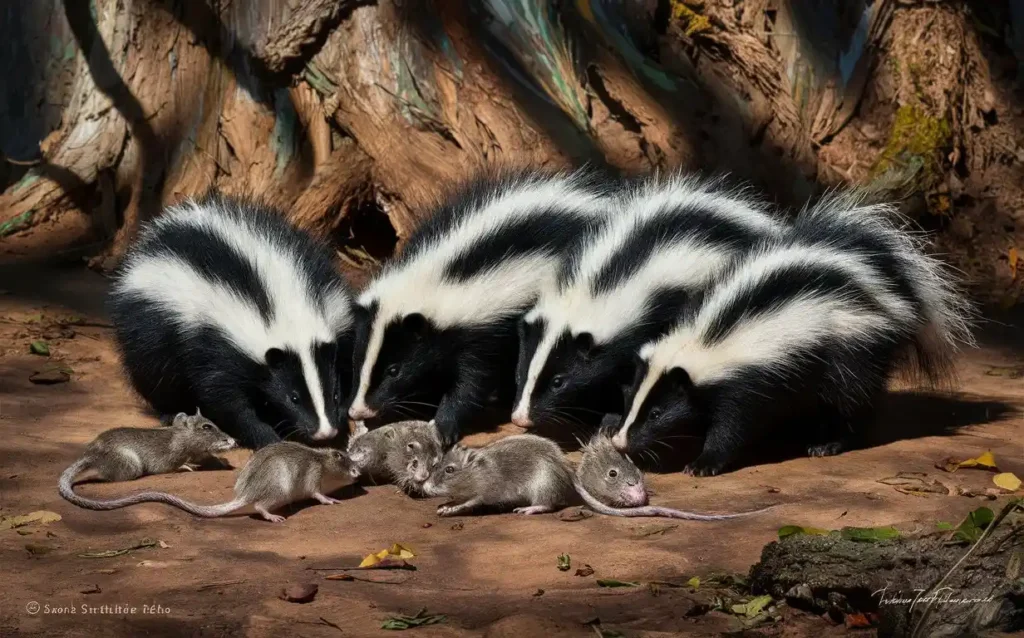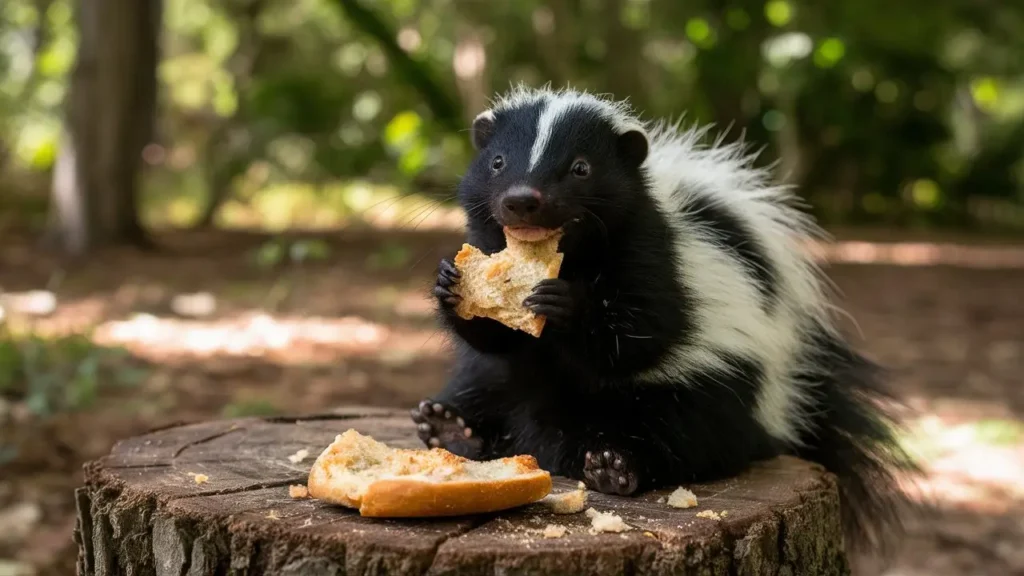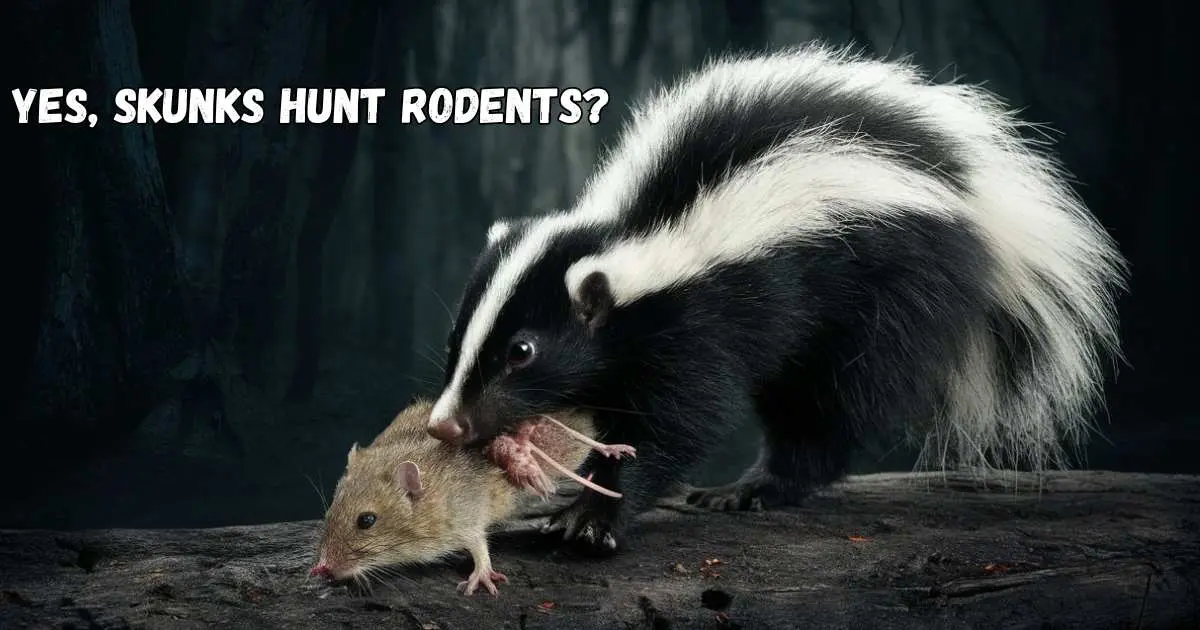Do Skunks Hunt and Eat Rodents? Learn More
Last updated on November 4th, 2024 at 05:14 am
Through my experiences with pet skunks and studying them in the wild, I’ve learned a lot about their eating habits. Skunks are not picky eaters; they will eat rodents when they come across them. These animals have a diverse diet that includes insects and small mammals. Curious about how skunks help control pests and fit into their ecosystem? Stick around to learn more about these amazing creatures.
Skunks In The Wild
Imagine a world where creatures great and small roam the earth, each playing their unique role in nature’s complex web. Among these creatures are the often-misunderstood skunks, known for their striking black and white fur and their ability to spray a, shall we say, memorable scent! But beyond their notorious defense mechanism lies the lesser-known story of skunks as predators. Do these mammals include rodents on their dinner menu? Let’s explore the lives of skunks in the wild, their habitat preferences, and their behavior patterns.
Habitat Preferences
Skunks have a nose for comfort and adaptability. Whether it’s a forest, field, or even an urban setting, skunks find cozy corners to call home. They often set up camp in:
- Abandoned burrows
- Hollow logs
- Under decks or sheds
They’re not picky; as long as there’s food and shelter, skunks can thrive.
General Behavior Patterns
Solitary and nocturnal by nature, these furry creatures lead a secretive lifestyle. Once dusk settles, skunks embark on their nightly ventures, foraging for quite a diverse buffet. Their eating habits are omnivorous and include:
| Food Source | Example |
|---|---|
| Insects | Beetles, Bees |
| Small mammals | Mice, Voles, and yes, even rodents |
| Plant matter | Berries, Roots |
Despite their infamous spray, skunks use it only as a last resort, preferring to keep a low profile as they roam the night.
The Skunk Diet
Skunks are not picky eaters. Their diet is as varied as the colors on their fur. People often wonder, do these creatures munch on rodents? Let’s unravel the mystery of what skunks really nibble on.

Foraging Techniques
Skunks are nocturnal foragers, meaning they hunt at night. They have sharp senses that help them locate food easily. Their foraging techniques are quite interesting.
- They use their nose to find meals underground.
- Skunks dig with their claws to reach grubs and insects.
- They can climb small structures to raid bird nests.
- Occasionally, skunks venture into urban areas to scavenge.
Dietary Staples
Skunks enjoy a diverse menu. Rodents are part of their diet, but they like other foods too.
| Food Category | Examples |
|---|---|
| Insects | Beetles, crickets, wasps |
| Small Mammals | Mice, voles, and yes, rodents! |
| Plant Matter | Fruits, nuts, berries |
| Other | Eggs, earthworms, reptiles |
Skunks balance their diet with whatever they find. They play an important role in controlling pests and helping the environment.
Skunks And Rodents
Imagine a skunk in the wild, its black and white stripes unmistakable in the underbrush. Many people recognize skunks for their notorious defensive spray, but what about their diet? Do these creatures relish a meal of rodents, or do they stumble upon these small mammals by chance? Let’s delve into the relationship between skunks and rodents to understand their interactions.

Hunting Or Opportunistic Feeding?
Do skunks set out with the intent to hunt for mice and rats, or do they simply feed on these creatures when the opportunity arises? Skunks have a varied diet, but focus on how they relate to rodents in terms of hunting:
- Nocturnal foragers: Skunks search for food at night.
- Low to the ground: Their bodies are well-adapted to snuffling through underbrush.
- Evidence of digging: Skunks often dig for grubs and insects but might uncover rodents.
Interaction With Mice And Rats
Skunks and smaller rodents like mice and rats can encounter each other, especially near human habitation where food sources are abundant. Skunks might be viewed as pest control as they can reduce rodent populations. Let’s observe their interactions:
| Interaction | Frequency |
|---|---|
| Natural Predation | Occasional |
| Scavenging Opportunities | Common near human settlements |
| Impact on Rodent Populations | Variable, potentially beneficial |
Understanding how skunks interact with rodents sheds light on their ecological role and behaviors. As both active hunters and opportunistic feeders, skunks contribute to the dynamics of their environment, often in surprising ways.
Feeding Habits Across Seasons
Do skunks eat rodents? The answer lies in their diverse diet. Skunks adapt their eating patterns to the changing seasons. Let’s explore how these adaptable creatures find food throughout the year.
Summer Foraging
As summer blooms, skunks feast on a variety of foods. They are not picky eaters and their summer diet is particularly rich:
- Insects – a protein-packed snack
- Fruits – for a juicy energy boost
- Small rodents – occasional meals for sustenance
During summer, skunks may hunt for mice or voles at night. The abundance of prey makes hunting easier. Skunks use their sharp senses to locate and catch these small rodents.
Winter Survival Strategies
In winter, skunks face a tougher challenge. They rely on fat reserves and a strategic approach to find food:
| Food Source | Follow tracks in the snow |
|---|---|
| Leftover nuts and berries | Scavenge under snow |
| Insects in tree bark | Dig with claws |
| Rodents | Follow tracks in snow |
Rodent hunting in winter is not a skunk’s first choice. They prefer easier meals when available. Yet, they will hunt rodents living nearby if needed.
Nutritional Requirements
Understanding the Nutritional Requirements of Skunks is crucial to comprehend their dietary habits. Skunks are omnivores, meaning they enjoy a varied diet.
Protein Needs
Protein is a key component in a skunk’s diet. It supports muscle growth and repair. Animal protein forms a large part of their intake. Skunks often hunt for:
- Small rodents such as mice and voles
- Insects
- Earthworms
- Small amphibians
These protein-rich sources help skunks meet their dietary needs. They also eat lizards, snakes, and birds when available.
Fats And Carbohydrates
Fats and carbohydrates are also vital for skunks. They provide energy for daily activities. Skunks might consume:
- Fruits
- Nuts
- Grains
These foods offer the fats and carbohydrates necessary to sustain their active lifestyles. Skunks need to balance their food types to stay healthy.
Impact On Ecosystem
Skunks are more than just their famous, pungent spray; they play vital roles in ecosystems. By feasting on rodents, they help maintain a balance in nature. This role includes controlling rodent populations and contributing to biodiversity.
Rodent Population Control
Skunks are natural predators to many rodents. Their diets consist of various creatures, including mice and rats. This predation is crucial for keeping rodent numbers in check.
- Reduces crop damage
- Prevents spread of rodent-borne diseases
- Controls rodent population growth
Skunk Predation And Biodiversity
By preying on different rodent species, skunks encourage a healthy ecosystem. Diverse diets support varied habitats.
| Rodent Species | Impact on Ecosystem |
|---|---|
| Mice | Seed dispersal, soil aeration |
| Rats | Waste breakdown, nutrient cycling |
Skunks hunting these species help to sustain the balance. They ensure no single species dominates, promoting ecosystem health.
Skunks And Human Encounters
Most people know skunks for their stinky spray. These black and white creatures are more than their smell. They share our urban areas and sometimes eat rodents. Understanding skunks helps us live together better.

Urban Skunks And Garbage
Skunks often wander into cities. They search for food in our trash. This can lead to surprise skunk meetings! Did you know they love to dine on our leftovers? But, why do they come to urban areas?
- Easy food: Trash cans are skunk buffets.
- Shelter: They find homes under decks and in sheds.
- Less danger: Cities mean fewer predators for skunks.
Skunks add to urban wildlife. But, they can rummage through bins. This can be a nuisance for residents.
Preventing Negative Interactions
We can stop bad run-ins with skunks. Taking simple steps matters. It keeps skunks and people safe. This helps us coexist without trouble.
| Problem | Solution |
|---|---|
| Skunks in trash | Secure lids on bins |
| Skunks under the house | Seal entry points |
| Nervous about sprays | Give skunks space |
- Don’t leave food outside. This attracts skunks.
- Use motion lights. Skunks avoid bright areas.
- Keep yards clean. Remove hiding spots for skunks.
Wildlife Rehabilitation And Skunks
Did you know that skunks do more than just spray a stinky odor? These black and white creatures play a unique role in our ecosystem. They even eat rodents sometimes. But when skunks get hurt, they need our help. This is called wildlife rehabilitation.
Rescue And Diet
Wildlife rescuers work hard to save injured skunks. They take these furry friends to special places where they can get better. Skunks eat lots of things. In the wild, their diet can include:
- Fruits and berries
- Insects and grubs
- Small rodents like mice
When in care, skunks might eat foods like:
| Food Type | Examples |
|---|---|
| Fruits | Apples, bananas |
| Proteins | Cooked chicken, mealworms |
Rehabilitation Challenges
Helping skunks can be tough. Here are some challenges:
- They spray. Skunks can spray a bad smell to protect themselves. This makes rescue tricky.
- They eat different things, so finding the right food in rehabilitation is important.
- Skunks can carry diseases like rabies. This means rescuers must be very careful.
Frequently Asked Question
Skunks can deter rodents due to their predatory nature and odor; their presence may make rodents avoid the area.
Skunks are drawn to yards that offer food sources like garbage, pet food, and grubs. Accessible shelters such as decks and sheds also attract them.
Skunks are omnivores but rarely eat squirrels. They mostly prefer insects, fruits, and small rodents, but squirrels are typically too agile and large for skunks to hunt effectively.
Conclusion
Wrapping up, skunks have varied diets that sometimes include rodents. These creatures adapt their eating habits based on environment and food availability. Understanding this aspect of skunk behavior can enhance our knowledge of backyard wildlife ecology. Remember, nature’s intricate food webs are complex and ever-evolving.

